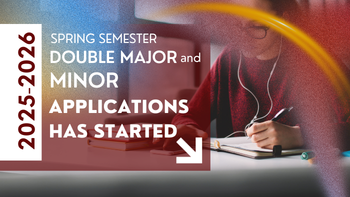2025-2026 Spring Semester Double Major and Minor Applications Has Started
The Double Major and Minor applications of our students studying at our university have started.
21/01/2026
Our Mission
The mission of the program is to be an educational initiative committed to adding value to learning and society by training cabin crew personnel who are responsive to the needs of the national and international civil aviation sector, capable of transforming their knowledge into service quality through professional competence and ethical values, and focused on safety, communication, crisis management, and passenger satisfaction.
Program Vision
To be a pioneering and exemplary program in the aviation sector by training cabin crew members who are scientifically and professionally equipped, sensitive to human life and social values, capable of delivering services in line with safety, passenger satisfaction, and ethical principles, able to think in a multidisciplinary manner and develop innovative solutions, and who possess strong self-confidence, communication skills, and a commitment to quality and excellence.
Program Educational Objectives
The main objective of the program is to graduate individuals equipped with the following competencies:
• To provide professional knowledge and skills in accordance with international standards.
• To train individuals with developed communication, crisis management, and representation abilities.
• To foster individuals who internalize ethical values, safety, and service quality.
• To educate professionals proficient in foreign languages and culturally aware.
• To raise individuals who are open to lifelong learning and professional development.
Program Qualifications (Program Learning Outcomes)
Graduate Profile
Graduates of the program:
• Prioritize passenger satisfaction and safety,
• Are qualified to work in national and international airline companies,
• Have developed ethical values, aesthetics, and representation competence,
• Possess strong crisis management and communication skills,
• Are team-oriented professionals capable of assuming responsibilities.
Employment Opportunities
• Cabin crew in national and international airline companies,
• Ground service support personnel in private air transportation firms,
• Protocol and customer relations officers in the tourism, hospitality, and service sectors,
• Ground services personnel at airports.
Purpose of the Program
Developments and regulations in the civil aviation sector encourage more and more airline companies to join the civil aviation sector. Parallel to these developments, passenger transport by airline; domestic and international flights and destinations are increasing rapidly. The program aims to meet the demand for trained cabin service personnel required by companies in the sector. It is aimed to train staff who have knowledge about the civil aviation industry, its relationship with other sectors and international civil aviation organizations and rules, flight attendant duties and responsibilities, flight service, normal safety procedures, crew resource management (CRM), passenger relations, emergency rules, first aid. Special conditions required by the cabin services profession will be sought for student admission to the program. The relevant articles of the guideline should be examined in the selection phase.
Civil Aviation Cabin Services, a 2-year associate degree program, accepts students with TYT score. Program students learn with the 3 + 1 Model. With this model, our students complete competency courses, core courses, professional field specialization courses in 3 semesters of 4 semesters, which are the duration of the program, and in the last 1 semester they receive practical training in the sector enterprises.
If the graduates are successful in the Vertical Transfer Exam, they can transfer to the 4-year bachelor programs of the universities or complete their bachelor degree education at a university abroad.
In the Civil Aviation Cabin Services program, our students are given four hours of language training per week for the Dyned English language exam system applied by Turkish Airlines during recruitment. With this training, it is aimed that our students will be successful during their recruitment as flight attendants after graduation.
Academic Staff
This content was updated on 23/01/2026.

The Double Major and Minor applications of our students studying at our university have started.
21/01/2026It is very easy to follow Beykoz University closely, all you have to do is share your e-mail address with us. With the weekly newsletter, you can be instantly informed about upcoming events, news and many more.